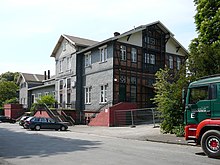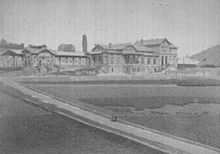Wuppertal-Mirke train station
| Wuppertal-Mirke | |
|---|---|
|
Platform side (2007)
|
|
| Data | |
| Design | Through station |
| abbreviation | KWM |
| opening | 1879 |
| Conveyance | 1991 |
| location | |
| City / municipality | Wuppertal |
| Place / district | Mirke |
| country | North Rhine-Westphalia |
| Country | Germany |
| Coordinates | 51 ° 16 '0 " N , 7 ° 8' 43" E |
| Railway lines | |
| Railway stations in North Rhine-Westphalia | |
The Wuppertal-Mirke train station (also: Mirker Bahnhof ) is a historic train station in Wuppertal . The station building (station building) was entered in the list of historical monuments in 1987 .
The station building
The "Wuppertaler Nordbahn" was built by the Rheinische Eisenbahn-Gesellschaft (RhE) from 1873 as a competing route to the main route of the Bergisch-Märkische Eisenbahn-Gesellschaft (BME) and opened on September 15, 1879.
The station building by the architect Eberhard Wulff was completed in 1882 and was intended to compete with the Elberfeld station on Döppersberg built in 1848 as the second main station . The station building was placed on the green meadow, as the contemporary photo shows. The development of the northern part of Elberfeld at that time went as far as Albrechtstraße at the height of the then Kreuzkirche . At the time of construction, only the north road was unpaved and led past fields.
Shortly after the opening of the Mirk train station, the rapidly growing city surrounded the train station, Friedrichstrasse was an important feeder road to Neumarkt and was extended behind the Kreuzkirche as Neue Friedrichstrasse to the station. At the same time, Friedrichstrasse connected both of Elberfeld's main railway stations.
Originally, the station building was supposed to be more representative than that of the BME, but for financial reasons it stayed with a more modest design. It was built from several sub-elements that are adapted to the regional Bergisch style with half-timbered elements. Numerous commercial companies settled in the area around the station, including the well-known Gold-Zack Werke AG and the Hebebrand twisting mill .
In the middle of the 20th century, the now federal railway's own Rhenish line increasingly became a branch line. As a result, the station lost its importance. There was a ticket sales counter until the mid-1970s. Facilities such as lost property and express goods handling were discontinued earlier.
On September 27, 1991, the line was completely closed for passenger traffic. From then on, the station building was not used.
In the last phase of the route use, the route was used by trains of the DB series ETA 150 , most recently with two trains each in both directions.
After the closure, the station area visibly deteriorated. First the roofing of the platform was removed, later the track structure was also removed.
Today the building is on the Nordbahntrasse cycle path .
Todays use
The building was entered on the list of historical monuments on August 31, 1987.
The interior was used as a film set in 2003 for the final shots of the feature film Bye Bye Blackbird and in 2013 for the film King Ping as well as for various short films and music videos.
The building, which is not in the best condition, was to be converted into a theater by a small group . Olaf Reitz , Reinhard Schiele and Thomas Beimel , who initiated the theater project, founded the association “Culture in Mirker Bahnhof” Wuppertal eV . 70,000 euros were also committed by the NRW Foundation for Nature Conservation, Heritage and Culture . The “Theater Paradies” was supposed to open in 2004 in the old first class waiting room. But since the building is under compulsory administration because the buyer of the property had speculated and there are disagreements with the landlord, the project was delayed further and further.
The Paradies theater experienced another setback when on January 13, 2007 the theft of 18 valuable historical windows was discovered. The police and monument protection authorities started investigations into the painted lead-glazed round windows.
Olaf Reitz tried to link the theater project with the project of the Wuppertal Movement eV to convert the Rhenish route into a cycle path . Unknown perpetrators carried out an arson attack on the building on April 27, 2008, in which fire accelerators were used. There was minor property damage.
Before that, in the summer of 2006, the railway site was occupied for a few weeks by a group of site trailer residents. The reaction of the residents was divided. One resident supplied the wagon castle with electricity, while others, mainly dependent on public traffic, welcomed the imminent evacuation of the site.
In addition, a doctor's practice was housed in the building, and a dance school also uses the premises.
Utopia city
Since 2011, the station has housed “Utopiastadt”, a creative network with offices, studios and coworking space . In the same year the Hackerspace / dev / tal moved into the main building. In 2013 the “Hutmacher” opened a restaurant, in 2014 the free bike rental Utopiastadtrad and the Utopiawerkstadt as an open workshop / fablab. Since 2017, the outbuilding of the former baggage handling has been completely renovated, mostly through voluntary work. For the urban gardening project Utopiastadtgarten, the aquaponics system of the association "Aufbruch am Arrenberg" moved to the Utopiastadt campus in 2018 .
In 2018, the Utopiastadt project was awarded the Federal European City Prize. On December 5, 2018, Utopiastadt gGmbH bought 11,100 m² of land around Mirk train station, including the area of the former baggage handling area and the catering area. A purchase offer was signed for a further 25,000 m². In 2019 Utopiastadt was one of two winners of the Social Sculpture Award. The prize is awarded to social actors who creatively change social conditions in the spirit of Beuys' " social sculpture ".
In 2021 the Solar Decathlon Europe will take place on the Utopiastadt campus , the concept “Solar Decathlon goes Urban” was co-developed by Utopiastadt.
See also
Individual evidence
- ↑ From rubber bands to carpet manufacturers - textile history at the Mirk train station. In: wuppertal.de. Retrieved November 27, 2018 .
- ↑ Economy and entrepreneurship in the Elberfeld Nordstadt - does that exist? ( Page no longer available , search in web archives )
- ↑ Peter Laudenbach: That works: Paradise without subsidies. In: brandeins. Retrieved May 29, 2018 .
- ↑ Brash Thief: The Fall of Man in Paradise ( Memento from September 26, 2007 in the Internet Archive ) Westdeutsche Zeitung (online) from January 15, 2007
- ↑ Brazen theft
- ^ Wuppertal Movement eV: Trassenfest a complete success ( Memento from September 29, 2007 in the Internet Archive )
- ^ Arsonists set fire to Mirker Bahnhof Westdeutsche Zeitung (online) from April 28, 2008
- ^ Timeline - event from 2006 to 2015. In: Clownfisch. Retrieved May 29, 2018 .
- ^ Utopiastadt redevelops baggage handling Westdeutsche Zeitung (online) from April 18, 2017
- ↑ Farmbox will be located on the Utopiastadt campus Westdeutsche Zeitung (online) from April 12, 2018
- ↑ Winner: Wuppertal Federal Competition European City (Online), November 8, 2018
- ↑ Utopiastadt grows by 11,000 square meters Westdeutsche Zeitung (Online) from December 14, 2018
- ↑ Press release from SSC Social Sculpture Corporation (online), November 2019
- ↑ Urban Solar Decathlon - International student innovation competition for buildings comes to Wuppertal. Retrieved October 22, 2019 .


